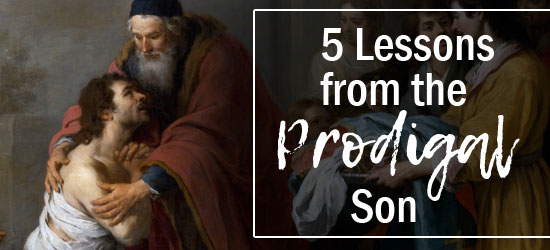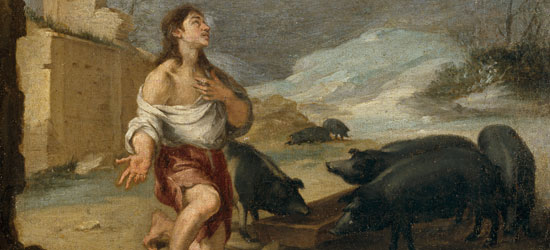
One of my favorite parables, and one of my favorite passages in the entire Bible for that matter, is the story of the Prodigal Son. In it, we can learn a few lessons from the Prodigal Son.
Let me explain why.
This parable really illustrates the mercy of God and His love for each and every one of us. It is very rich in spiritual symbolism.
There is more to this story than meets the eye. What does the prodigal son teach us?
I think we can learn 5 important lessons from this parable:
- How does God allow us to use our free will?
- What happens when we seek our own way of life?
- How does God respond to our return?
- God restores our relationship
- We are not in this alone
First, let’s take a quick look at the Parable of the Prodigal Son. It is found in the Gospel of Luke, chapter 15, starting with verse 11:
Then he said, “A man had two sons, and the younger son said to his father, ‘Father, give me the share of your estate that should come to me.’ So the father divided the property between them.
After a few days, the younger son collected all his belongings and set off to a distant country where he squandered his inheritance on a life of dissipation.
When he had freely spent everything, a severe famine struck that country, and he found himself in dire need.
So he hired himself out to one of the local citizens who sent him to his farm to tend the swine. And he longed to eat his fill of the pods on which the swine fed, but nobody gave him any.
Coming to his senses he thought, ‘How many of my father’s hired workers have more than enough food to eat, but here am I, dying from hunger. I shall get up and go to my father and I shall say to him, “Father, I have sinned against heaven and against you. I no longer deserve to be called your son; treat me as you would treat one of your hired workers.”’
So he got up and went back to his father. While he was still a long way off, his father caught sight of him, and was filled with compassion. He ran to his son, embraced him and kissed him.
His son said to him, ‘Father, I have sinned against heaven and against you; I no longer deserve to be called your son.’
But his father ordered his servants, ‘Quickly bring the finest robe and put it on him; put a ring on his finger and sandals on his feet. Take the fattened calf and slaughter it. Then let us celebrate with a feast, because this son of mine was dead, and has come to life again; he was lost, and has been found.’ Then the celebration began.
Now the older son had been out in the field and, on his way back, as he neared the house, he heard the sound of music and dancing. He called one of the servants and asked what this might mean. The servant said to him, ‘Your brother has returned and your father has slaughtered the fattened calf because he has him back safe and sound.’
He became angry, and when he refused to enter the house, his father came out and pleaded with him.
He said to his father in reply, ‘Look, all these years I served you and not once did I disobey your orders; yet you never gave me even a young goat to feast on with my friends. But when your son returns who swallowed up your property with prostitutes, for him you slaughter the fattened calf.’
He said to him, ‘My son, you are here with me always; everything I have is yours. But now we must celebrate and rejoice, because your brother was dead and has come to life again; he was lost and has been found.’”
So why did Jesus tell this story? What does the story of the prodigal son mean?
As I mentioned, there are 5 lessons I want to point out.
How does God allow us to use our free will?
The first lesson we can take away from the Parable of the Prodigal Son, is how God let’s us use the gift of our free will.

God gives us, as humans, the freedom to choose. He gives us free will.
We know this going back to the opening of Genesis in chapter 2, with Adam and Eve and how God let them eat from any tree in the Garden.
The only exception was the tree of knowledge of good and evil. They were not to eat from that tree.
So what does free will mean? That we can do whatever we feel like, and it’s ok?
Not at all.
It means that we have the ability to choose good.
We were made for good, but God does not force it upon us. We can choose it.
How, then, does the story of the prodigal son teach us about how to use our free will?
The story starts out with the younger of the two sons requesting his share of his father’s inheritance.
Wow, talk about an insult!
Not a good choice of freedom, am I right?
Normally, an inheritance is received after a death.
Here, the son is basically saying “I don’t want to have to wait for you to die. I want my share now.”
This is very insulting towards the father, not only in Biblical times, but even today.
Can you imagine asking your parents for your inheritance while they are still alive?
Regardless of the insult, the father grants the request of the son and hands over the share to his younger son.
Jesus starts this parable in this way to illustrate how God allows us to use our free will, as well.
God is a giver. He gives us lots of gifts.
We don’t always use these gifts, or our freedom, to the best of our ability or in our best interest.
Nonetheless, we still receive them.
God permits us to pursue our own way, even if it does not align with His way, or His will.
Just like the younger son in the parable, we are able to misuse our freedom, but God will not stop us from doing so.
What happens when we seek our own way of life?
After the father grants the younger son’s request and hands over his share of the inheritance, the son packs up his belongings and heads off to a distant country, or a foreign land.
He goes far off, far away from his father and family.
He’s trying to live the dream.
It is there, that the younger son squanders away everything.
In one of his homilies, Bishop Robert Barron says that this “distant country”, in Greek, is “quora machra”, which translates to “the big empty space”.
All of us at some point in our lives head to this “big empty space” in some form or other.
We try to get as far away as possible from God (as if we actually can).
It is in that big empty space that we try to do our own thing, find our own happiness, ignore what God is trying to tell us, or what the Church is teaching.
We may find ourselves indulging in things to try to find happiness and pleasure. Things that seem to make everyone else happy.
No matter where we turn, we see this in our culture today.
After all, we tell ourselves that we know what’s best, right?
However, it leaves us feeling empty inside. That big empty space then turns inside of us, spiritually.
When all is said and done, when we abuse our free will and choose our own way instead of God’s way, we end up very unhappy.
At this point in the parable, the younger son has nothing left and a severe famine hits the land.
He’s hungry.
The spiritual symbolism continues on.
When we live a life of dissipation, or a life that focuses on seeking worldly pleasures, we try to fill our lives with lots of things that we think will satisfy us.
But we are left hungry as well.
We feel desolate. Empty.
We hit rock bottom.
Then, we do what the younger son does next.
He is desperately trying to recover, but still in his own way – away from his father and on his own.
The younger son gets a job tending to swine – aka, the pigs.

Keep in mind, he is in a foreign land. Being Jewish, this would have been a humiliating job, to tend to a foreigner’s (or pagan’s) pigs.
But he is desperate, grasping at anything to try to fix the situation he got himself into.
We, too, take desperate measures to try to “fix” our own hunger, unhappiness, and emptiness.
We think we can fix it on our own.
But we can’t.
It just seems to get worse.
Just like in the parable, the son hits rock bottom and only wishes he could eat even the slop that the pigs are eating.
Then, the parable takes a turn – the son “comes to his senses”.
His hunger initiates his return home.

How does God respond to our return?
As the younger son comes to his senses, he decides to go back to his father.
Like many of us realize at some point, we need to return to God in our own lives to seek His mercy.
It is usually initiated by the fact that we have no where left to turn.
In the parable, the son prepares a speech, if you will, to ask his father for forgiveness, and to hire him just as he would a servant.
As the son returns home, it is here that the beauty of the parable comes to life.
You see, the father saw him coming while he was still a distance away.
That means the father was waiting for him. He was actively watching for his son’s return, just as God awaits for us to come to Him.
It says that the father is filled with compassion.
The father was filled with such compassion and joy that he ran to his son.
The son started with his prepared remarks, but the father was so quick to grasp his son and welcome him home that he interrupted him in the middle of it.
The beauty is that God is like that with us.
When we return to Him after we are away from Him, He is there waiting for us to return with open arms.
It is never too late to turn to God. We are never too far off.
How uplifting it is to know that our God waits for us to return when we stray from Him.
I think, at times, when we wander from God in our lives, we’re almost afraid to go back.
We think that we’ve gone too far, to the point of no return. We’ve already condemned ourselves to hell.
But we couldn’t be further from the truth. God is there waiting for us.
How do we return?
As Catholics, I would suggest it starts by going to confession.

How hard do you find it to go to confession after not going in a while?
It seems like the longer it has been, the more we dread going.
[Related Content: How to Make a Good Confession]
But that’s just in our minds. That is on our end, not God’s.
Maybe we dread going because we’re afraid of what the priest might say to us.
Like the son in the story, maybe we even prepare a “speech” of what we will say.
But we shouldn’t look at it in this way.
A few years back, during the Year of Mercy, Pope Francis encouraged priests as confessors:
 “Every confessor must accept the faithful as the father in the parable of the prodigal son: a father who runs out to meet his son despite the fact that he has squandered away his inheritance. Confessors are called to embrace the repentant son who comes back home and to express the joy of having him back again.”
“Every confessor must accept the faithful as the father in the parable of the prodigal son: a father who runs out to meet his son despite the fact that he has squandered away his inheritance. Confessors are called to embrace the repentant son who comes back home and to express the joy of having him back again.”
“May confessors not ask useless questions, but like the father in the parable, interrupt the speech prepared ahead of time by the prodigal son, so that confessors will learn to accept the plea for help and mercy pouring from the heart of every penitent.”
The sacrament of reconciliation (confession) is all about receiving God’s mercy.
Through the priest, God is in that confessional with open arms, rejoicing, and ready to celebrate with our return to Him.
In the parable, did the father reprimand his son when he returned?
Did he yell at him? Tell him to leave his presence? That he disowned him?
No, he rejoiced at his return. He wanted to throw a party!
We need to let go of the anxieties of going to confession, even after it may have been a while since we’ve last gone – even if it’s been decades!
God wants us to come to Him.
He is there, just like the father in the parable, watching for us, and immediately rejoices when we return.

God restores our relationship
As we continue through the Parable of the Prodigal Son, the father doesn’t stop by running to the son and embracing him in joy.
He proceeds to dress him in the finest robe, gets him sandals, and puts a ring on his finger.
What does all this mean?
After all, the son has just returned from living a life, that I imagine, is filled with fancy clothes and such, before he lost it all.
At first glance, it seems like the father is giving back to the son what he has lost. Is the father encouraging the son to continue such a lifestyle?
The father is giving the son things he lost, but it is not mere possessions.
What is actually taking place is that the father is restoring the son.
He is giving him a robe and sandals to wear, instead of the probably wretched and ripped, smelly clothes he had been wearing.
The father is acting in mercy.
He “clothed the naked”.
The father has given more than clothes. The father restored the son’s dignity.
He doesn’t stop there.
He puts a ring on his finger.
What is this significance? Where else do we see rings being put on fingers?
A wedding comes to mind.

The father, here, is restoring a relationship.
It is symbolic of the relationship that we, as sons and daughters of God, are also in a relationship with God.
Jesus is the bridegroom, and we, as the church, are His bride.
Just as the father re-established his relationship with his son, God restores our relationship with Him.
He puts a ring on our finger and we are His sons and daughters.
The father was so happy to have his son back in his life. God is even more ecstatic to have us as His sons and daughters.
God reminds us of our sacred nobility and our relationship with him.
Just like the father in the parable, God still doesn’t stop there.
The father then called for the servants to bring some food. Did the father only give him something to eat to satisfy his hunger at hand?
No, he gave him a feast! They had a celebration.
Only God can satisfy the hunger we have.
God satisfies our hunger way more than we even think we need.
Bishop Barron said “The link to God, the link to our Father, who is giving, is the source of life. As long as we’re connected, we are willing to receive the gift that God gives. Then we have life and life to the full.”
Jesus said, “I came so that they might have life and have it more abundantly.” – John 10:10
God desires us to be fully connected with Him. He wants us to fully participate in His divine life.
Earlier in the parable as the son was reflecting on returning home, he recounted that even the servants of the father have more than enough to eat.
What does this mean?
When we are attached to the Divine Life, we have more than enough, as well.
God’s grace is enough (2 Corinthians 12:9) and that is the only thing that will satisfy us completely.
When we are attached to the Divine Life, that is when we are fully alive.
“The glory of God is man fully alive.” – St. Irenaeus of Lyons
We are not in this alone
As the parable comes to an end, it seemingly ends with a sour taste almost. But I see an important lesson here, nonetheless.
The older son is very upset with the younger son and even the father.
He must feel a favoritism is being shown towards the younger son, in that he complains that a feast has never been thrown for him, even while he has always been obedient to the father.
The father tries to console the older son by telling him that he has always been with him and everything he has is his. And his son, who was lost, is now found.
So what lesson can we learn from the older son?
Even if we have spent a good portion, if not all, of our time with God in good relationship with Him, we should not be upset with our brothers and sisters who were gone and return at a later time.
We all experience and need God’s mercy and love at some point in our lives.
We should celebrate with God and rejoice that our brothers and sisters made it home!
There is no need to feel threatened. While we are connected to the Divine Life, we all have everything we could possibly need and more, spiritually speaking.
We are called to love as God loves us. If we do so, we are never alone, in that we always have someone to turn to.
We are called to bear the weaknesses and struggles of our brothers and sisters.
“Wherever there are Christians, there should be an oasis of mercy.” – Pope Francis
Mercy is how we bring others to God – the fullness of life, full of joy, happiness, and peace.
Mercy awakens us to new life. It heals the brokenhearted, brings good news, and sets captives free (Isaiah 61).
To wrap it all up
This Parable of the Prodigal Son really cuts to the core. Like each of the parables of mercy, it brings each listener into the story.
It exposes our weakness and our hurt.
But it also expresses the love and mercy that God has for each and every one of us.
We all have wandered into the big empty space at some point, to some degree.
But there is hope.
We know that we can return to our Father and He restores our relationship. He puts a ring on our finger and we are His children.
God rejoices over us.
“Then let us celebrate with a feast, because this son of mine was dead, and has come to life again; he was lost, and has been found.”
What brought the son back to life?
It was the father’s mercy.
Want to go to confession but need a refresher on how to do it?
Learn how to make a good confession in this post.
(This song, Turn Around, written by Matt Maher, is a great reminder that we don’t have to take the broken road. We can turn around and go back home to our Father, God!)
